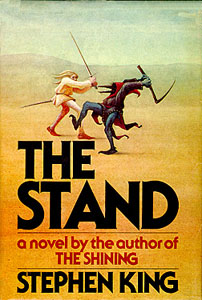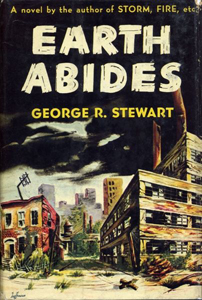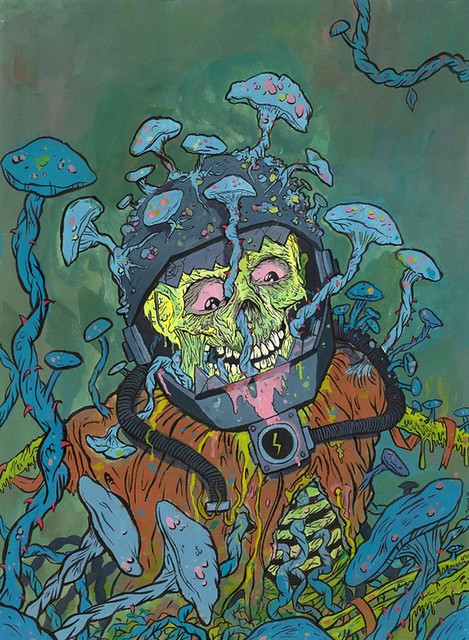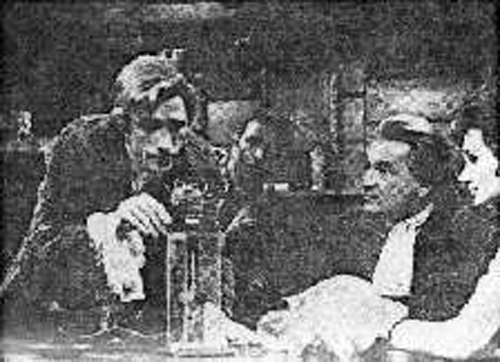


Super Mario Brothers (and other genre games): the Next Generation
Video games are science fiction, right?
Well, at least, they can be. Metroid, Einhander, Portal, even Space Quest.
They can also be horror — Parasite Eve, Phantasmagoria, and Resident Evil. And they can be fantasy.
I mean, how much more fantastical do you get than an overweight, moustached plumber jumping on turtles and anthropomorphized mushrooms in an attempt to save a princess who’s been kidnapped by a cross between a dragon, a stegosaurus, Morla, and Michael Savage?
I’ve been thinking a lot about Super Mario Brothers lately. I have a story that’s been perennially submitted that sort of retells the origin of SMB. I’ve been playing the game since the NES — and even remember the extra-tough arcade version at the skating rink in Davie, Fla., where I grew up. And now, with the Wii, I’ve been enjoying the hell out of New Super Mario Bros Wii.
As has my four-year-old daughter.
Not at all unexpectedly, she’s been interested in video games for quite some time already — her first love was Mega Man, and you haven’t lived until your child has interrupted a dance demonstration to show you off by telling a story about how you and she play video games together — and for months we’d sit together and I’d play while she made up stories. But recently, on a suggestion from my friend Chrome, I put a controller in her hands and taught her how to play.
She hasn’t looked back. We play Mario quite a bit now, and she’s not terrible at it. She loves riding Yoshi and imitating the voices of the characters. She gets a major kick out of defeating me (I try to let her win, but she’s surprisingly adept at not collecting coins). And even her imaginary friends are now Mario-related — Bowser, Princess Peach, Koopa Jr, Wendy O. Koopa, and Ludvig Von Koopa.
And when we discovered the old Super Mario Brothers Super Show! on Netflix, well… she was just thrilled.
What she hasn’t done yet, though, is try to act like the actual characters in the game. That is, to try and jump on bad guys or break bricks. But at least one person has: this guy, who hacked his Kinect to show just how tough it would be to really play SMB.
It’s kind of cool to watch how much difficulty he has just trying to get the first super mushroom in 1-1 of the original SMB. Not in a schadenfreude way, but in a “wow, that should be so simple” kind of way.
Makes me not want a Kinect. At all. (Sorry, Microsoft; if you want to advertise here, we’ll still take your money, we promise.)
I wonder how many of us got our start in sci-fi or fantasy as young kids with video game systems, jumping on mushrooms and ducking into pipes, collecting coins and power-ups, and defeating Bowser over and over, only to be told the princess was in another castle. How many of us ran through our houses or our backyards, jumping on imaginary bad guys — or real toys, like soccer balls and pool floats — and flinging imaginary fireballs — or ping-pong balls, or tennis balls, or even baseballs?
The video games we played when we were young — at least, if you’re my age (that is, in elementary school in the 80s) — have a profound effect on what we like now, I think. And I think it’s because we had to use our imaginations. When I played Combat with my dad, I had to fill in the details. At age four, I vaguely knew what tanks were… but I definitely knew what a fighter plane looked like, and in my mind my fighter planes were totally getting blown to smithereens by my dad’s. When I finally got a Nintendo and started playing Super Mario Brothers, 8-bit graphics were awesome… but I still had to use my imagination a little. As games got better, and I got better at them, I used my imagination less and less.
Nowadays, my daughter knows exactly what her favorite video game characters look like. I wonder if, in 20 years, she’ll still hold as fond a place in her heart for the Super Mario Brothers as I do for Combat and the other Atari 2600 games I used to play (and the shows I used to watch with my dad when I was between four and ten — Star Trek, the A-Team, Knight Rider, WCW Wrestling). I wonder if my attempts to indoctrinate her in the things I like — video games, sci-fi (on a limited basis), Miami Dolphins football, thinking farts are hilarious — will stick as well as my dad’s stuck with me.
Just… not too sticky. The last thing I need is this playing at her wedding.

Vincent Di Fate in Omni (1982)
A painting from Vincent Di Fate’s “Stellar Technician” pictorial
The Best of Omni Science Fiction #3 (1982)
(Via Skiffy)

Genres: Medical
Escape Pod 269: Élan Vital
Show Notes
Show Notes:
- Feedback for Episode 261: Only Springtime When She’s Gone
- Next week… The future of corporate America
Élan Vital by K. Tempest Bradford is licensed under a Creative Commons Attribution-NonCommercial-NoDerivs 3.0 Unported License.
Based on a work at escapepod.org.
Élan Vital
By K. Tempest Bradford
The few minutes I had to spend in the Institute’s waiting room were my least favorite part of coming up to visit my mother. It felt more like a dialysis room, the visitors sunk into the overly-soft couches and not speaking, just drinking orange juice and recovering. There were no magazines and no television, just cold air blowing from the vents and generic music flowing with it. I’d finished my juice and was beginning to brood on my dislike for overly air-conditioned buildings when my mother arrived attended by a nurse.
I kissed and hugged her, automatically asking how she was, mouthing the answer she always gave as she gave it again.
“I’m fine, same as always.”
It wasn’t strictly true, but true enough.

The Soundproof Escape Pod #2
We at Escape Pod have been thrilled and gratified at the response for the first Soundproof Escape Pod. We got kudos for everything from the fact that it existed, to the awesome layout job by our own Bill Peters.
Speaking of Bill, this month I want to announce our staff changes. Escape Pod is hitting its stride now, thanks mostly to our new assistant editor. We promoted Bill Peters from the inside joke of Assistant to the Regional Manager, or the Right A.R.M., to Assistant Editor. He wrangles the slush and makes sure I am on top of things, and I don’t know where I’d be without him. We’re also delighted to welcome Mat Weller on as our audio producer. If you listen to Escape Pod, you’ll notice that Norm Sherman of the Drabblecast (a fine, award-winning podcast you should totally listen to) is still a part-time host, who, incidentally, makes me work harder on my intros.
Speaking of slush, in order to get a hold of the reins of this mighty team of slush ponies, we’re closing to submissions over December. We’ll be back on the job in January, once the hangovers fade.
Contents:
- Escape Pod 265: We are Ted Tuscadero for President, By Chris Dahlen
- Review: Shades of Milk and Honey by Marie Robinette Kowal, Review by Sarah Frost
- Escape Pod 266: Kachikachi Yama, By Michael R. Underwood
- Dark Fiction Magazine Q&A, By Adam Christopher
- Escape Pod 267: Planetfall by Michael C. Lea
- Review: A Princess of Mars by Edgar Rice Burroughs, Review by Josh Roseman
- Escape Pod 268: Advection by Genevieve Valentine
- Review: Zero History by William Gibson, Review by Sarah Frost
The ePub version can be downloaded here.
Edit: The ePub version we previously put out was apparently broken for several types of ePub reading software. It has been hopefully repaired and replaced.

Escape Pod 268: Advection
Show Notes
Show Notes:
- Feedback for Episode 260: The Speed of Dreams
- Next week… The difficulty of watching a parent die.
Advection by Genevive Valentine is licensed under a Creative Commons Attribution-NonCommercial-NoDerivs 3.0 Unported License.
Based on a work at escapepod.org.
Advection
By Genevieve Valentine
The first day of fifth year a boy came in with the new eyeshields, a glossy expanse of black with no iris or pupil, and looking at him was like looking into an eclipse.
All the other girls said it made them uncomfortable; they teased him to take them out, to put on some normal sunglasses like everyone else. They said they’d never forgive him for hiding eyes in such a handsome face.
“Fortuni, it’s a little much,” said someone.
That was how I learned his name.
We were all Level Two intelligence, but before the first week was over the news was out that some had managed to find the money for a sixth year. Janik Duranti, who spent the history lectures drawing stick figures screwing on his computer screen, was getting a sixth year. I’d be cleaning his office someday. Answering his phones. Updating the registration on his blue ID cuff.
Carol Clarke opened the top button on her shirt as soon as the shades went down; obvious, but it was worth it to be married to a guy who had a sixth year.

Apocalypse now
So, you like The Walking Dead, huh? It’s neat, right? An ongoing post-apocalyptic TV series about zombies, based on an award-winning comic. What’s not to love? And fortunately, they’ve done a mighty fine job on the adaptation. This viewer is pleased. Zombies are popular at the moment, cresting at the top of one of those unpredictable waves of fashion. The Walking Dead has come at exactly the right time, whether by design or accident, and all power to it.
But this series fits into another genre, that of the post-apocalyptic. And this is where I have a confession to make.
I don’t like post-apocalyptic. Post-apocalyptic is predictable, formulaic, and easy. There, I’ve said it.
This is, of course, not true. Post-apocalyptic is also hugely popular and always has been, not just with the general public but with discerning genre fans like you and I. It seems that wiping out humanity in some global catastrophe is something that, maybe, we all secretly wish for. I mean, if we were among the lucky survivors, it’d be free reign, right? No work, no more need for money. No more cruelty and tyranny, no more pollution, overpopulation or war.
And of course no people, no family, no friends, no loved ones, and the beginning of a huge struggle for survival against impossible odds in a situation likely to psychologically traumatise even the most hardened survivalist.
So okay, not so neat.
I said I don’t like post-apocalyptic, and that bit is true. Post-apocalyptic is formulaic, simply because the scale of the situation is such that any fiction set after the disaster must follow similar plot lines. The survivors are isolated, and then eventually find each other. Cities are empty or full of the dead (or the walking dead). There is no power, no medicine. Every manmade resource is suddenly very finite indeed. And so on, and so on. Plotwise, most post-apocalyptic stories are more or less the same.
I should point out here that I’m no expert. I have friends who are very dedicated followers of end-of-the-world stories, and no doubt about now they’re ready to put their keyboards through the computer screen in frustration. But hear me out. Post-apocalyptic may suck, plotwise, but where it really shines is in characterisation. Possibly more than any other genre, post-apocalyptic depends upon strong characterisation. Because if all the plots are the same, or similar (and I’m talking pure plot here, which is different to story and situation), then all you have left are the survivors. And it is how the survivors act in their new environment that makes the story. I’m not saying that characterisation is unique to the post-apocalypse, far from it, but I am saying that if you’re about to write an epic tale of an empty world, you’ve got to be prepared to engage the reader with some very, very powerful players.
With that in mind, and as a self-confessed post-apocalyptic skeptic, here’s my list of five tales that, to me, are among the best examples of the post-apocalyptic. I’m not just going to regurgitate a list from Wikipedia (and, my heavens, there is quite a list on there), these are personal choices that I think are either great examples of either characterisation or perhaps an unusual or uncommon take on the post-apocalyptic plot. Having just slated the genre for being formulaic, let’s see if there are any stories which break the mould.
Before I continue, there’s also an important distinction to make here between those stories which are genuinely post-apocalyptic, and those which are really apocalyptic. Post-apocalypse, by definition, implies that the menace, threat, disaster, alien invasion, plague, etc, have been and gone. What we are left with is the world and the people left afterwards. Stories like the recent film Skyline, or 2012, or great classics like The War of the Worlds take place while the disaster is unfolding. While the aftermath may be considered post-apocalyptic (although probably not in the case of The War of the Worlds), we don’t see that bit. I’ll admit here I’m going to cheat on one entry in my list below, but only because I think it’s a particularly fine and relatively unknown example.
The Quiet Earth

I’m really sure how well known New Zealand cinema of the early 80s is outside of that country, but The Quiet Earth is well worth tracking down. It tells the story of a man who wakes up one morning to find the world empty − whatever the apocalypse was (I shall reveal nothing), it actually physically removed the world’s population, so our hero (played by the wonderful Bruno Lawrence) finds himself genuinely alone. With a completely deserted Earth, not even a single corpse in sight, Lawrence carries the majority of the film on his own. It’s a remarkable performance as his character goes from confusion, to exhilaration (with nobody around the world is his oyster… if he wants to drive a giant earthmover through a gas station to see what happens, why not?) and finally to total paranoia and delusion. And after all, if you were the only human being left on the planet, wouldn’t you start to think you were special? The Quiet Earth is out on DVD and I’d recommend you grab it.
The Stand

The grand-daddy of all post-apocalyptic stories, Stephen King’s 1978 tale of the survivors of a super flu which wipes out most of the human population is rightly considered a classic. At an eye-watering 1300 pages, this book is a perfect example of character over plot. Of course, King is known for this, but while the concept of a superflu (one engineered by the military as a biological weapon that is released accidentally) was old hat when King wrote it, the journey of the survivors as they find each other and come to terms with their new world is brilliant. Although the central plot eventually reveals itself − that of the survivor’s journey to Las Vegas to make their stand against an evil that has arisen − how the characters react and cope is what makes this whopping tome a real page-turner. If you haven’t read any King, this wouldn’t be a bad place to start. Afficiandos think that this is his best work; while I personally prefer ‘Salem’s Lot, if you have any doubts about the post-apocalyptic genre, this will set your mind at rest, as it did mine.
Earth Abides

Twenty-nine years before The Stand was published, academic George R. Stewart wrote his single novel which might be called “genre”. Earth Abides is another that follows the standard post-apocalyptic formula − a super-sickness kills everyone, leaving only those immune to the disease alive − but you can forgive Stewart for this given that it was probably a newer story concept back in the 1940s. Earth Abides might be that one book that I’d take to a desert island, should I be so abandoned. It’s beautiful, moving and sad, and sticks in the mind not just because of the human characters and their journey but because of Stewart’s depiction of the world itself. In Earth Abides, the Earth itself is a character. Rid of destructive humans, it begins to regenerate, reclaiming itself and returning to an earlier pre-industrial (you might even say ‘default’) state. Stewart conveys this in a striking way, with a key motif being the silence of the world. Without humans and their cars, planes, factories and technology, the Earth is mostly silent, the loudest sound being that of a thunderclap. In this quiet Earth, the survivors gather and attempt to reconstruct society but ultimately they fail, instead regressing to a more primitive level of society. This only reinforces the central theme of the book. The Earth abides; humanity does not.
The Road
I’m cheating here. I’m not talking about Cormac McCarthy’s Pulitzer Prize-winning post-apocalyptic novel, one which dominated the responses on Twitter when I put out a call for recommendations. I’m talking about Quatermass creator and master of British science fiction Nigel Kneale‘s one-off BBC television drama from 1963, now sadly lost from the archives and only surviving in script form plus, it seems, one manky photo. Also, it’s not really post-apocalyptic. In fact, it is really pre-apocalyptic. In the 18th century, the inhabitants of an English village shun the road that runs through the nearby woods, for the woods are haunted and people have heard terrible things. As the story reaches the climax, it is revealed that the manifestations on the road are the echo of people fleeing an atomic explosion in the present day, somehow riverberating back in time. The juxtaposition of modern − police sirens, recognisably modern people running in abject terror for their lives − with the old, with the 18th century characters cowering in terror, completely unable to comprehend the sound which we, the viewer, recognise all too well, must have been both brilliant and chilling when it was first shown.
Survivors

I can’t make this list, self-confessed archive television nut that I am, without mentioning Terry Nation’s BBC TV series, Survivors. Again, the scenario is pure post-apocalypse cliche. Humanity is mostly wiped out by a plague, strongly implied to be deliberately engineered and released by accident. Over three seasons between 1975 and 1979, Survivors charted the journey of the survivors as they found each other and ultimately formed a community. Critics often bemoan the transformation from gritty science fiction survival story to “soap opera”, but I think they’re confusing soap opera with character-driven drama, and this is where Survivors shows its real strength (characterisation, see?). Survivors was remade for a modern audience over two seasons in 2008 and 2010, but here the tired nature of the premise was in full effect, rendering the remake flat and pointless. Survivors should be experienced in all its 70s glory.
The Dalek Invasion of Earth
A sixth entry, mainly because Nigel Kneale’s The Road doesn’t quite count. The Dalek Invasion of Earth was the second appearance of the Daleks in Doctor Who, and was broadcast in six episodes from November 21 to December 26, 1964. Despite the title, this isn’t about an alien invasion. By the time the Doctor and company arrive in a deserted, dilapidated London, the Daleks have been the masters of the Earth for a decade or more. Here we discover that the Daleks first employed a virus to weaken society before arriving in force, and years late the surviving humans are either enslaved or gathered in disparate resistance groups.
The Dalek Invasion of Earth is Doctor Who‘s first foray into alien invasion and one of the rare occasions it featured a genuinely post-apocalyptic story. Extensive location work around London makes this story something of a small-screen epic, and to this day it is regarded as one of the best stories of the show’s early years.
There are many more that are worth of this list − as already mentioned, The Road by Cormac McCarthy, but also Wall-E, Boneshaker by Cherie Priest (perhaps a rare example of post-apocalyptic confined to a very specific place, namely the walled city of Seattle). UK genre publisher Abaddon has a entire ongoing post-apocalyptic series, The Afterblight Chronicles, which are well worth checking out. Like I said I’m not post-apocalyptic scholar so please, nominate your own prime examples of the genre in the comments and teach me a lesson.
Now, if you’ll excuse me, I have the next episode of The Walking Dead to watch.

The Perils of Timely Fiction
About two years ago, I was flying with my family and I noticed that, when we landed, all I could hear was the sound of everyone’s cell phone booting up.
A month later, I had a 9000-word short-story about airport security. Taking place about 50 years in the future, it’s about a man traveling to Los Angeles to see his daughter and the rigmarole he has to go through.
It has yet to sell. I’ve cut down the word count, I’ve revised several times, I’ve sent it to a couple dozen publications… and no dice. No one seems to want it. (It almost made it to the top at Andromeda Spaceways, and the readers gave me good feedback, but they didn’t publish it.) I’m pretty sure it’s not getting bought because nothing actually happens — a man flies to Los Angeles to see his daughter – and editors I guess want stories where there’s action.
But that’s neither here nor there. Not at the moment.
Last Monday, as I sat at my desk at work watching post after post about security theater pass by on Tweetdeck, I felt a little spark of hope that my story might soon find a home.
Unfortunately, it often takes months for stories to get from the slush pile to the editorial desk.
I understand that. I really do. And I’m very patient – I follow the submission guidelines to the best of my ability, I never bother editors unless the official response time has passed by more than a full week, and I don’t complain about form rejections. The reality of writing is that there’s a metric buttload of us and a relatively small number of editors and markets.
Still, now that I’ve exhausted most of the long-story markets, it’s going to be harder for me to find a home for my story. I predict a long couple of nights of rewriting, followed by sending out the story… and waiting.
And waiting.
And waiting.
Just like every other burgeoning author.
Thing is, by the time my story gets to the top of the slush pile, the timeliness of it will probably be moot. All this hullabaloo about scanners that don’t detect bombs in body cavities, scanners that show screeners your naked body, fines being levied against people who refuse to be body-scanned and don’t want your hands on their junk… it’ll all be over in three, six, nine, or 12 months (or whenever the story eventually is read by an editor who wants it). Then it’ll be another three to 18 months until it actually sees print. At that point, we’ll have moved onto another cause celebre. Twitter will be complaining about the next Apple tablet that doesn’t do That One Thing Everyone Likes, or a politician who said That One Thing Everyone Thought Was Idiotic, or the fact that people without That One Smartphone are technological luddites who don’t deserve to pray at the altars of their mighty cellphone providers.
I’m okay with that. I really am. But it makes me wonder if I should mention in my cover letter that I wrote the story in response to airline security woes. Usually my cover letters are very simple: here is my story, I hope you like it and choose to publish it, thank you. (Soon they will include the location of my first professional publication, but until I have a contract in hand I’m not revealing it to a wider audience.) Would saying why I wrote a story help much? Would it give the slush reader the impetus to nudge it a little higher in the “stories for the editor to read” pile (provided the slush reader likes it enough to pass it on, of course)?
I don’t know. I’m not an editor. But I do know this: regardless of what happens with the story I’ve just been blogging about, I’m going to keep writing timely fiction, and if it gets published too late… well, I don’t think I’ll care, because it will get published.
Eventually.

Closed to Submissions for December
Hey Folks,
Quick programming note: Escape Pod will be closed to submissions for the month of December. This is partly to get though a slight backlog of stories in the system now and also because as we get closer to the end of the pro-rate experiment we’ve got some things to figure out.
I never know how to end these things, so I’ll steal from Mur and—
Be Mighty,
–Bill

Genres: Aliens
Escape Pod 267: Planetfall
Show Notes
Show Notes:
- Feedback for Episode 259: The Lady or the Tiger?
- Next week… Weather: wild, and planned.
Planetfall by Michael C. Lea is licensed under a Creative Commons Attribution-NonCommercial-NoDerivs 3.0 Unported License.
Based on a work at escapepod.org.
Planetfall
By Michael C. Lea
Galthas Talisar stepped out from the buzzing chaos of the transportal and onto lush greenery. This world was alien, to be sure, but the patterns were almost familiar. The ship’s oracles had chosen well.
Behind him, the transportal hummed again. An armored leg emerged and carefully found its footing on the blue-green ferns carpeting the jungle floor. More than twenty thousand miles above, the leg’s owner shifted his weight and stepped fully through an identical transportal, instantly emerging on the planet’s surface below.
That cautious step belonged to Urjik, who could be called cautious in few other ways. In fact, his reputation had left him few other options for a willing partner on this mission. Urjik did not care. He and Galthas had fought together against the worst the Zayeen had to offer. He trusted Galthas implicitly, despite his disdain for the other scrawny ascetics from Signet Battalion.
Urjik’s greenish skin and jutting lower canines marked him as a charuk, his bloodline tainted by nether influences. Despite this stigma, and despite his temper, he had risen quickly in Rampart Battalion. Even the most burdensome battlesuit did not slow him, and no one was a truer shot with an inferno cannon or a hex-impelled railgun. (Continue Reading…)



.jpg)



